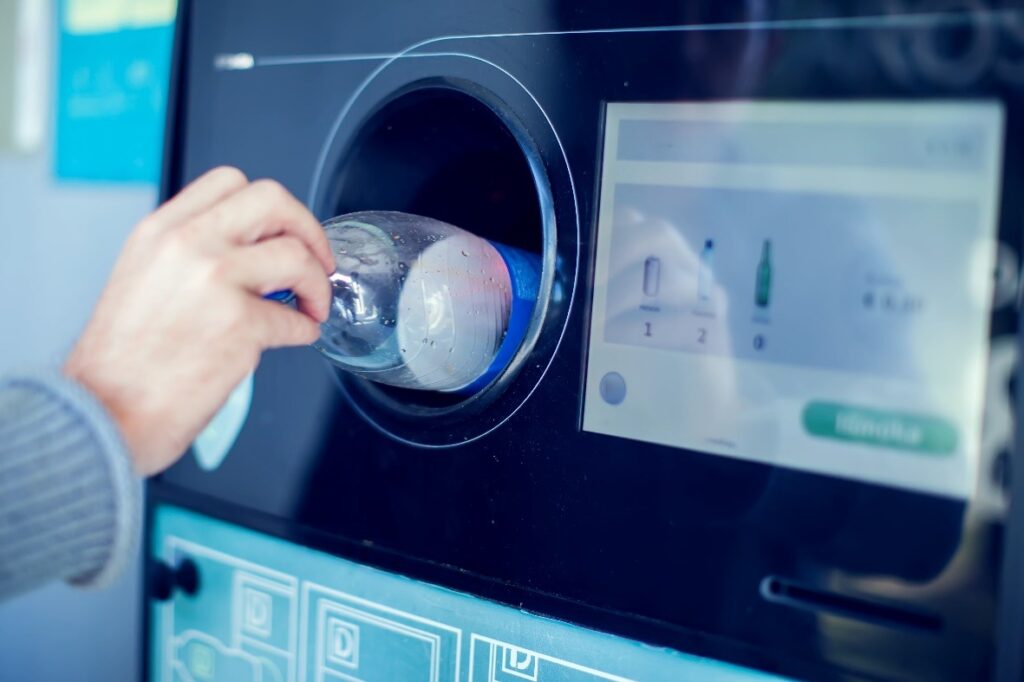
Bottle deposits are also referred to as ‘container law.’ It is a recycling incentive program in which a distributor charges a few extra cents from a store that purchases bottles. Similarly, you are also charged some extra cents when you buy the bottle directly from any store and when you return the empty bottles, you get your money back. The stores then return the whole bundle of bottles to the distributors and get their money back. Many collection points are available, including reverse vending machines and bottle return depots. The average return rates of bottle depots in Calgary and other areas are $0.10 for 1 litre or less and $0.25 for more than 1 litre bottles.
Advantages of bottle deposits
There is a lesser chance of breakage and contamination when bottles are collected through bottle depots, making high-end products after recycling. This also prevents unnecessary landfills. Thus, this reduces greenhouse gas emission, which is higher when recycling contaminated bottle waste.
Some of the many benefits of bottle deposits are.
Increase the rate of recycling
In many countries, the recycling rates have increased, ranging from 57-95%. They have made an effort to make many bottle return depots that are easily accessible by the people living nearby. Many countries like Norway have added a tax if the overall country’s recycling rate falls below 95%. “On average, states with bottle deposits have a beverage container recycling rate of 60%, compared to 24% for states without bottle bills, according to the Container Recycling Institute.”
Lower littering
People dispose of empty bottles more efficiently when they know they will get a cashback after each return. No one will let their valuable things go off that quickly, knowing even a tiny amount of cash would be returned. However, if a bottle is left and someone sees it, he will dispose of it at a proper bottle depot to get the money. These waste bottles make up approximately 40% of the total litter.
Increase in job opportunities
The bottle deposit process creates more space for job opportunities in the retail, warehouse, recycling, and bottle depots. Many bottle return depots in Calgary and other areas have come into existence after this law, and many people are required to do the job to make the whole process smooth.
Cleaner beaches, parks, and trees
The bottle deposit system provides incentives for people after they return their bottles, which is a big reason that the littered bottles on the coast side and parks have been reduced by 40%. It is especially true in the states that have implemented this system by establishing and maintaining proper bottle return depots.
Encourages manufacturer and consumer responsibilities
With the association of the environmental and societal costs with the production, dumping, and recycling of bottled waste, a question has arisen it fair to charge the money from the taxpayer who is only drinking tap water and not consuming any of the bottled drinks? In this matter, the manufacturer has also supported that they should take responsibility for these costs by implementing the bottle deposit system. The consumer is also equally charged and hence reduces the burden on the taxpayer, who does not have to pay for disposing of the empty bottles.
Conclusion
The presence of multiple bottle depots increases bottle retrieval, opens up more job opportunities, shifts the cost of recovery on the bottles’ producers and consumers, and decreases environmental pollution. It provides numerous environmental and economic benefits in the state where it is made mandatory. For a better outcome, it is recommended to hold a meeting involving primary stakeholders to discuss the preferred type of bottle depots in Calgary and other areas with high bottle waste. Moreover, this system educated the people to consider their waste a valuable source, and they started disposing of it more responsibly.


